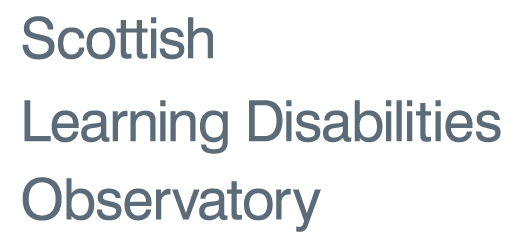Reports

Understanding local approaches to supporting parents with learning disabilities
Parents with learning disabilities have the same legal right to family life as others, yet many face stigma, inaccessible services, and higher rates of child removal. This project aimed to understand local support available, the number of parents with learning disabilities, and outcomes for children across Scotland. Read the latest findings in this report.
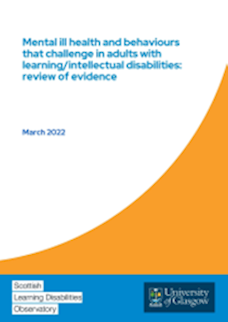
Mental ill health and behaviours that challenge in adults with learning/intellectual disabilities: review of evidence
This rapid review of the current evidence on mental ill health and learning/intellectual disabilities was commissioned by the Scottish Government to support the drive to improve the mental health and wellbeing of people with learning/intellectual disabilities in Scotland.
In this report, we have reviewed and updated the following guidelines from NICE:
- Mental health problems in people with learning disabilities: prevention, assessment and management (NG54), 14th September 2016
- Challenging behaviour and learning disabilities: prevention and interventions for people with learning disabilities whose behaviour challenges (NG11), 29th May 2015
Read the report here and the appendices here.

Research Voices project
The Research Voices project was funded by the Wellcome Trust as a joint project between The Scottish Learning Disabilities Observatory and Talking Mats.
This project established a Citizens’ Jury of people with learning disabilities to debate and deliberate on health research. A Citizens’ Jury is a demographically representative group of Citizens who come together to deliberate on important issues and offer recommendations for the future.
You can access the Citizens' Jury Evaluation report in three formats: an executive summary report, the full report and an Easy Read version. We have also produced a number of case studies from the project which you can read here.
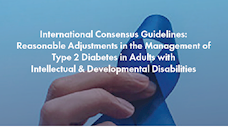
New international guidelines for management of Type 2 Diabetes in adults with learning disabilities
The new International Consensus Guidelines:Reasonable Adjustments in the Management of Type 2 Diabetes in Adults with Intellectual & Developmental Disabilities are now available to read here.
The report outlines clear and tangible guidelines for health, disability, social care professionals and family carers on how to make reasonable adjustments support adults with intellectual and developmental disabilities improve the self-management of type 2 diabetes.
These guidelines were developed by members of the International Association for the Scientific Study of Intellectual and Developmental Disabilities (IASSIDD) health specialist interest group. This project was led by Dr Laurence Taggart from Ulster University, along with SLDO researcher Dr Maria Truesdale; Dr Henrietta Trip and Dr Jenny Conder from University of Otago, New Zealand; Dr Lisa Whitehead, Edith Cowan University, Western Australia; Dr Brianne Redquest and Professor Yona Lunsky, Centre for Addiction and Mental Health, Canada; Jillian Scott, Learning Disability Team, NI; and Dr Lorna Rouse, Open University, England.
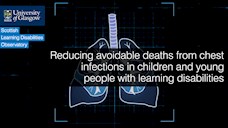
SLDO film: Reducing avoidable deaths in children and young people with learning disabilities
This short film was developed to highlight the high rate of deaths from preventable causes, such as chest infections and choking, among children and young people with learning disabilities. The film is aimed at health and social care workers and educators, carers, and families of children and young people with learning disabilities and our intention is to raise awareness of four key areas for action:
24 hour Postural Care
Swallowing Problems
Vaccinations
Health Information
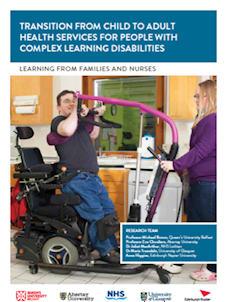
Transition from child to adult health services for people with complex learning disabilities
This report summarises the findings and recommendations from a Scotland-wide study exploring the challenges faced by people with learning/intellectual disabilities during the transition period from childhood into adulthood. This period has been identified as particularly difficult for people with learning/intellectual disabilties and their families, as they often experience barriers to accessing appropriate services, leading to poorer health outcomes.
This report draws on evidence from families, nurses and other professionals which has helped to identify best practice strategies for effective transition, set out as seven evidence-based recommendations.
The study was led by Professor Michael Brown, Queen’s University Belfast along with SLDO researcher Dr Maria Truesdale and Professor Zoe Chouliara, Abertay University, Dr Juliet MacArthur, NHS Lothian and Anna Higgins, Edinburgh Napier University
What Are Learning Disabilities? How Common Are Learning Disabilities?
This report provides a useful definition of learning disabilities and how such definitions emerge. The report also reviews various data sources and provides details on how many children and adults with learning disabilities are in Scotland, with further detail explaining why figures differ between these data sources. The report also puts Scotland’s reported prevalence of learning disabilities within an international context, and comparisons are made with the prevalence of learning disabilities from other countries. However, the report highlights the limitations in making such comparisons.

Scotland's 2011 Census Analytical Reports
The following reports present summary statistics from Scotland's 2011 Census on people with learning disabilities or autism:
Summary statistics on health of people with learning disabilities or autism - Scotland
Summary statistics on other topics regarding people with learning disabilities or autism - Scotland
Summary statistics on people with learning disabilities aged 13-24 - Scotland
Summary statistics on people with learning disabilities and autism - Scotland
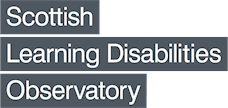
Narrative Report: A Sociological Exploration of the Impact of Hate Crime on the Health and Wellbeing of People with Learning Disabilities in Scotland
This narrative literature review focuses on hate crime, learning disability and wellbeing in Scotland. This review forms part of an ongoing piece of research linking hate crime to health and wellbeing for people with learning disabilities.
Read the report here
